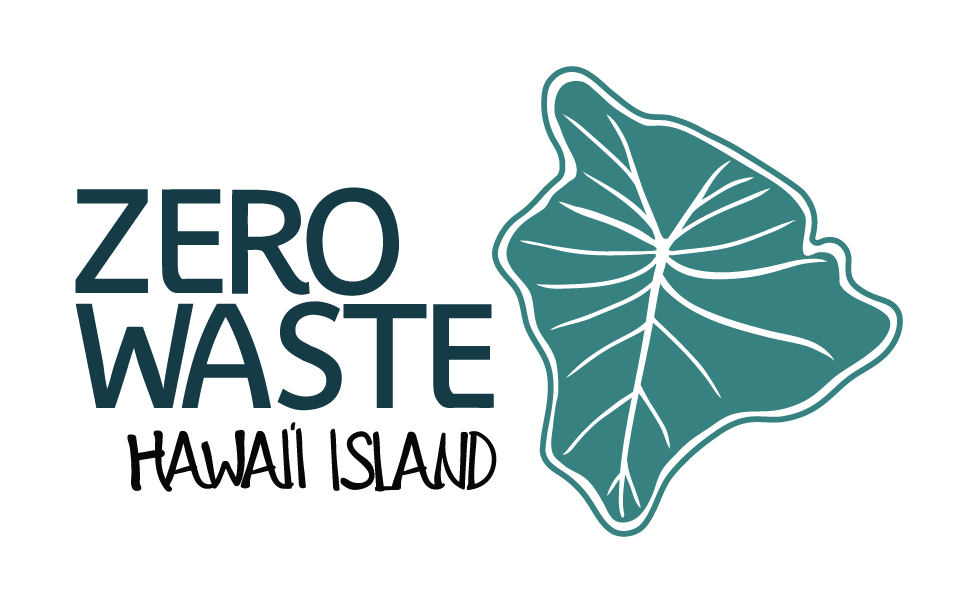Re-Indigenization of Zero Waste Culture
ʻAnoʻai me ke aloha iā kākou a pau a puni ka honua!
Greetings of aloha between us all around the world!
We at Zero Waste Hawaiʻi Island (ZWHI) have been reflecting heavily on “zero waste culture” and how little the topic honors the indigenous knowledge systems that precede it. As a result of the feedback we’ve gotten from the community outreach we did alongside Perpetual earlier this year, we decided to reform the identity of our organization to honor and further engage the indigenous communities we are part of. We’ve been working to ensure that our Mission, Vision, Guiding Values, and even our logo (e ola ka ʻohana Keolanui!) match our truest intentions for this work - so that by this time next year, we can be more accountable to the hopena (yield) of our intentions. We invite you to adopt this mission, vision, and value set, and join us in learning more about the re-indigenization of zero waste culture.
We know that in ancient times, “trash” didn’t exist. Everything we touched, used, ate, came from and returned to the land and sea, and the akua (microbes) of the earth. “Trash” is a result of our collective separation from indigenous wisdom, knowledge, and value systems. While some people commonly use the term “throw away”, we know that our trash never goes “away”, but is consumed, rather, by our oceans and our beloved land. Re-indigenizing zero waste culture involves the restoration of ancestral (circular) systems of health, wellness, and lifestyle. It calls us to the restoration of health in our own bodies and communities, to increase the capacity we have to reduce material waste.
Zero Waste Hawaiʻi Island’s mission is to engage diverse Hawaiʻi Island communities to achieve zero waste. Our vision is to create more opportunities for kanaka ʻāina akua leadership (leadership based on the relations between humans, land, and Spirit) through the restoration of family systems, community systems, and equitable policy.
Our Guiding Values are depicted by the following Hawaiian words:
-
Adopting a zero waste lifestyle requires an individual to assess and address their own spiritual, mental, physical, and financial capacity to participate in systems like reuse and reduction. Therefore, we concern ourselves with the wellness of the individuals we serve. The re-indigenization of zero waste culture calls for us to work closely with health and wellness organizations, events, and resources, which we will strive to do in the upcoming year.
-
DescriptioProfessing our love for the beauty of Hawaiʻi is not enough on its own; our actions of care and sustainability must follow. Developing true regard, not just for general ʻāina (land), but for specific mountains, rivers, oceans, and land features of Hawaiʻi Island is a step toward increasing our capacity to model that affection with environmentally responsible habits, routines, and actions. The re-indigenization of zero waste culture calls for us to work closely with place-based individuals, organizations, programs, and events that foster kuleana (responsibility) to Hawaiʻi Island places, which we will strive to do in the upcoming year.n text goes here
-
“Hawaiian gods” are traditionally represented by nature and natural phenomena. The word “akua” also translates to mean “microbe” as those in fertile soil. The re-indigenization of zero waste culture calls us to collaborate with systems of spirituality that are conducive to intentional living, interconnectedness, and joy through the connection we have to our environment, our soil, food, and forest systems. In the upcoming year, we will strive to engage these collaborations through our EA (Eat ʻĀina) Workgroup, dedicated to indigenous culture, farming, and education.
-
The ability for an individual to sustainably adopt a zero waste lifestyle largely depends on the capacity their family has to participate alongside them. We strive to support the family unit to be restored to a nohona (way of being) of health, presence, connection, and the ability to bring value to their communities. We endeavor to lend education and support to a minimum of 100 families/family representatives in the upcoming year.scription
-
We look to the multigenerational dwellers of each community as experts, and defer to their experiences to guide the mobilization of each community to restore the indigenous knowledge systems of each ahupuaʻa/ʻili ʻāina (land division). While this type of consultation is innumerable and priceless, we are hopeful for their openness to huipū (join together/connect) and we are preparing to seek their counsel in a way that will honor their lineage and experience while compensating them fairly in pay.
-
As our original mission intimated, we maintain our commitment to be active and involved in policy initiatives. While many indigenous communities are familiar with the process of defending land and practices in engaging with the “government”, we hope to collaborate with organizations like HULI PAC to encourage our communities to be involved in the processes of our “governance”, extending beyond our political engagement to exercise the ea of our lāhui, our ʻāina aloha, and our sovereign conduct.
Mahalo to the Perpetual Team and sponsors for supporting us through the development of our foundations, as we work to make meaningful and lasting change within our communities.
Mahalo also to Dayva Keolanui of Keolanui Consulting, who has carried us through the process of rebranding through the development of our logo and color scheme, which we hope to feature and explain in our next newsletter.
If you’ve made it this far in reading, I extend to you my deepest gratitude, and I invite you to stay connected with us as we make strides to embody these intentions into fruition. Mahalo for listening to the desires of our hearts as we work to be better stewards of our beloved land. We are working to huipū more regularly; we hope you’ll stay with us and join us as you are able.
